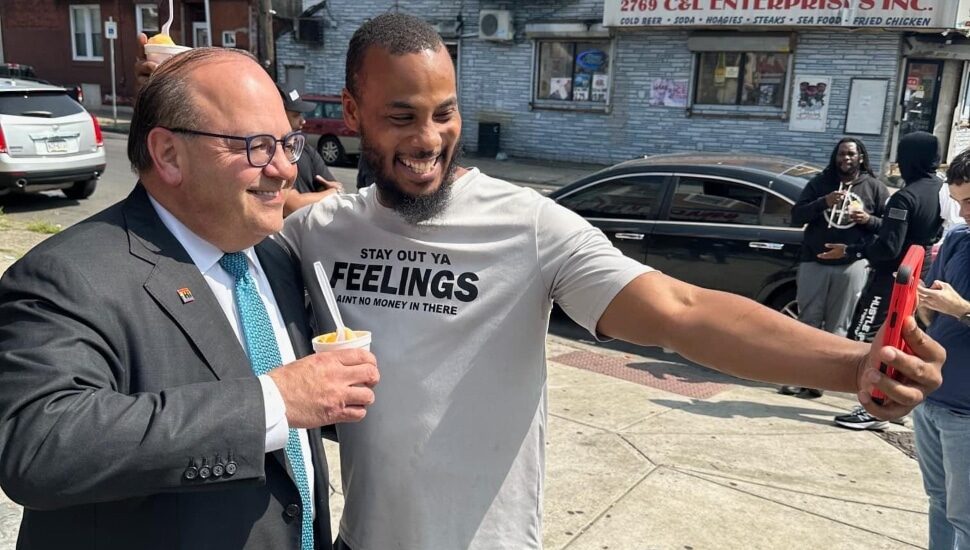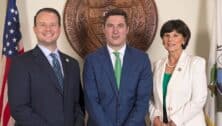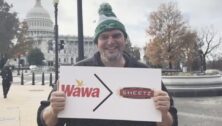Chester County Leadership: Allan Domb, President of Allan Domb Real Estate, Former At-Large Member of Philadelphia City Council and Candidate for Mayor


A week before the Primary Election in May, Allan Domb, one of several Democratic candidates running for mayor of Philadelphia, spoke to VISTA Today about his modest upbringing in Fort Lee, New Jersey, how he was always working, starting with shining shoes at age 5, and continued working full-time while attending American University.
After building a successful career in Philadelphia commercial and residential real estate, Domb realized he wanted to give back to the city of Philadelphia and served as an At-Large City Council member from 2015 through 2022. He discussed his priorities had he won the Primary and why he’s focused on outcomes rather than recognition.
Where were you born and where did you grow up, Allan?
I grew up in Fort Lee, New Jersey, right by the George Washington Bridge. I lived with my parents and my brother, who was four years older.
I grew up very modestly in an apartment building with 49 units called Marycrest. The apartment was 800 square feet, two bedrooms, one bath. The rent was $100 a month.
I remember when I was 12 years old and the whole building had no hot water for two weeks. My mother called the landlord on a Sunday morning to tell him, and he said, “How dare you call me on a Sunday,” and hung up on her. The next day she called the mayor, and we got hot water a day or two later. Then, a week later, the landlord sent us an eviction notice!
What did your dad and mom do for a living?
My dad worked in the embroidery business. Once I was in first grade, my mom joined him and worked alongside my dad. They would go in at 6:30 in the morning and come home at 7:00 at night. They always encouraged us to work. They grew up coming out of the Depression, so they were always careful with money. We didn’t have a lot of money, but we didn’t know the difference.
What part-time jobs did you have growing up?
I had all these different kinds of jobs, every possible part-time job. When I was 5 years old and my brother was 9, we’d go out at 5:30 in the morning and shine shoes before school from 5:30 to 7:30 for 25 cents a shine at the bus stop. When I was 11, I had two paper routes – one in the morning for the Hudson Dispatch and then the Bergen Record in the afternoon.
I was on the wrestling team in high school from ninth to 12th grade. After wrestling practice, I would work. Freshman year, I had a job in a gas station. Sophomore year, I worked as a janitor in an office building. And then I got a promotion – my first job in hospitality at the Howard Johnson’s on Route 46, right off the turnpike. I was a dishwasher for $1.65 an hour.
I went to school at American University in Washington, D.C. I took all my classes at night and worked full-time at a time lock business in Hyattsville, Maryland.
Why did you choose American University?
I applied to American University because my brother went there. I also applied to Fairleigh Dickinson University because it was local. I thought I wanted to be a landscape architect, so I applied to Delaware Valley Agricultural School. That was because I used to cut people’s lawns in high school.
I decided to go where my brother went. I graduated from American University in three and a half years.
Was American University the right choice for you?
Yes, a great choice. I was a worker bee. I took all my classes at night, worked a full time job and came to Philadelphia in November of 1976. The time lock company offered me a management position in the Philadelphia office for $15,000 a year. That was good money back then so I took the job.
What do you think they saw in you that made them offer that, Allan?
They knew my background from my job experience during college at the time lock company in Hyattsville, Maryland. I started out as a repair person. I then asked them if I could become a mechanic, and I assembled the locks. Then I asked them if I could sell. I sold one of the biggest accounts – Ashland Oil, with over 600 service stations. It was a very profitable sale for the company. They knew I had the skills to do well.
What was the first time you recognized you had those skills?
I don’t know that I ever really recognized it. I just kept my head down and worked.
Did you have any time for music when you were growing up?
When I was 5 years old, I took piano lessons. In high school, I was on the wrestling team, but in the fall, I wanted to join the football team. My parents wouldn’t let me join because my father played football in high school and got his teeth kicked in. So I ended up playing the saxophone in the band in ninth grade.
Did you have any favorite artists or bands that you listened to?
This is going to age me, but I still have my 45s. I remember Tommy James and the Shondells, “Hanky Panky,” Smokey Robinson – of course, the Beatles and the Beach Boys. Roy Orbison – “Pretty Woman.” And I loved Buddy Holly.
How did you get into the real estate business?
I put my head down and worked hard for two and a half years at the time lock company. I tripled their gross business from $223,000 a year to $670,000 a year. For all my hard work, the company gave me a $10 per week raise.
I said, “This is ridiculous.” I heard a guy on the radio named Jay Lamont, who was the founding director of Temple University’s Real Estate Institute. So, in the fall of ’78, after being at that company for two years, I decided to take real estate classes.
I entered the real estate business in January 1980, but I kept my other full-time job. I’d go to the real estate office from 6:30 in the morning to 8:30, and then I’d go to my full-time job from 8:30 to 6:00. On my one-hour lunch break, I’d be returning phone calls from people looking for real estate. Then I’d go back to the real estate office from 6:30 to 10:30 at night, Monday through Thursday. On Friday nights, I’d stop at 8:00, and Saturday and Sunday I’d work from 9:00 to 7:00. So I had two full-time jobs for three years.
But that wasn’t unusual for you – as you said, you’ve been a worker bee your whole life.
That’s true, but that was a lot. In 1983, I went into real estate full-time.
How did you get started in real estate – was it selling commercial or residential properties?
I read a book called “How to Be a One-Street Specialist.” I started selling residential properties, specializing in high-rise condominiums. I started in the area around 15th and Locust, at Academy House, then moved into Society Hill and Washington Square. The first conversion in the city was Society Hill Towers, so I went there. The next one was the Dorchester on Rittenhouse Square, so I went there, then the Hopkinson House, then the Philadelphian.
And then the last 20 years have been completely different than the first 20 years.
I did only residential, as a broker and entrepreneur, from 1980 to 1999. In 1999, I decided to redevelop existing buildings and repurpose them because I love bringing old, shuttered properties back to life. I started doing that in addition to the brokerage. I also got involved in the restaurant business – I love to eat, it’s no secret—and started supporting local entrepreneurs
What got you involved in politics?
I was president of the Greater Philadelphia Association of Realtors in 1990. They asked me to come back and serve as president in 2013, 2014 and 2015.
At this point in my career, Philadelphia real estate had been amazingly good to me.
In 2015, in my fourth year as President of GPAR, I realized that I could really help the city with my skill sets. I decided I was going to run for mayor. I sat down with political people who said to me, “You might know a lot about business, but you know zero about government. If you want to learn, join the City Council and then think about if you want to run for mayor. Otherwise, it’s like wanting to be a heart surgeon when you never even went to medical school.” He was 100 percent right. I went to City Council and after seven years I decided to run for mayor this past year because the city has several crises.
Where did that humility come from – stepping back and taking a lower position to train for a higher position?
It came from my parents. My goal was simple – all I wanted to do was help the city. I was focused on the outcome. I didn’t have the ego. I didn’t need the recognition. My goal was helping Philadelphians.
When I was president of the board of realtors, I changed our slogan. It used to be “the voice for real estate.” I said, “We need to be the voice for the future of Philadelphia, because the future of Philadelphia is key to everything – real estate, restaurants, attorneys, businesses, people’s lives, taking people out of poverty. It’s a bigger picture than just one category.” That made me realize that if I could visualize a much better city for all of us, that would be the greatest thing I could do in my life.
You’re running for mayor. What are your top three priorities as mayor if you win the primary next week and go on to win the general election?
Number one is public safety. Number two is providing better-quality schools and a better-quality education. And number three is making sure our kids have the ability to succeed in good-paying jobs.
We haven’t done a great job at some of those things. The biggest issue, by far, is leadership. Strong leadership solves these problems. Weak leadership exacerbates them. Any successful government, university, hospital or business has the same principle. If you have strong leadership, everything else falls in line.
What unique aspect of your personality differentiates you from the other candidates vying for the position?
What’s biggest for me is that my focus is on the outcomes, for the short and long term. I’ll make the right decisions, not just for today but for the next 10, 20 and 50 years. I’ve proved that throughout my career on Council. I always took the tough votes.
What’s also unique about me is that I can work with everybody. I’m a Philadelphian at heart. If you’re a Democrat, Republican, Working Families Party – I don’t care what affiliation you have. If you’re a Philadelphian, I’m going to work with you and we’re going to get to a better place.
I learned from Governor Rendell in 2015 – he said, “If you want to be successful in politics, do all the work and give away the credit.” I don’t need the credit. I need the outcome.
So, Allan, what do you do with all that spare time you have?
I don’t have a ton of free time. I have a rescue dog I enjoy. In the summertime, I enjoy going out on my wave runner. I enjoy going out to dinner. But lately, I’ve been working 24/7.
How about reading? What was the last book you read?
I don’t read a ton of books. The most recent books I read were “A Prayer for the City” by Buzz Bissinger about Ed Rendell and Michael Nutter’s book, “Mayor.” Here’s my problem – my average screen time on my phone per day is seven to nine hours. I’m answering emails, talking to people. I’m very service-oriented.
For exampletwo or three months ago, I got a message on LinkedIn from Marge LaRue. She writes to me, “Dear Allan, I read your public safety plan on your website, and I like a lot of the things you talk about. I would like to meet with you. My grandson, Nicolas Elizalde, was the 14-year-old who was killed walking off the Roxborough football game.” When I read that – I’m a father and a grandfather – your heart drops.
I met with her and Nicolas’ mother, Meredith Elizalde, for breakfast on a Sunday. I didn’t know how it was going to go. I didn’t know what to say to someone who has lost a child. The person who took their child away, his group had 18 prior gun violations – 18! – and was out on bail for drunk driving.
At breakfast, Meredith told me they hadn’t heard from the city about the case in four to six weeks. So, I picked up my phone and texted Police Commissioner Danielle Outlaw. Within 10 minutes she texted me back and said, “Deputy Commissioner Frank Vanore will get back to them Monday morning.” And he did!
Then Marge and Meredith told me that Nicolas, a week before he died, campaigned for Josh Shapiro as governor. A 14-year-old kid! I texted Josh and told him, “I think it would mean the world if you could reach out to her.” Within five minutes, Governor Shapiro texted me back saying that he would. That’s a lesson in leadership.
It’s a crazy world – what keeps you hopeful and optimistic?
The people of this city. We have tremendous people in this city. When I was on Council, and more so when I announced my candidacy for mayor, so many people came up to me and said, “I want to help you out. I love Philadelphia. Tell me how I can help.”
Finally, Allan, what’s the best advice you’ve ever received?
I think it was from my grandmother, who lived with us after my grandfather died. She said, “Never forget, your parents are your best friends. They will love you no matter what.” It’s stayed with me. I don’t have my parents anymore, but I think about how I can be a better parent to my son and grandchildren. I also ascribe to a well-known quote from Winston Churchill that says, “We make a living by what we get, but we make a life by what we give.”
Your parents would be proud of you, Allan.
Thank you, but I’m not sure about that! My parents raised me to be under the radar. They said, “You don’t need to be up front. You can do the work. You don’t need to be the front person.”
When I ran for Council, my mother did not want me to run, even though she said she would support me, but she didn’t want me to be exposed to what the public does to politicians. She was proud of what I did on Council, but at the beginning, she was concerned.
In 1991, I won an award in as the top entrepreneur in Philadelphia real estate. I was pretty young then, 35 or 36. I invited my parents to the Bellevue at the time. I remember my father saying, “I never thought I’d have a son who would win an award like this.”
Connect With Your Community
Subscribe to stay informed!
"*" indicates required fields







































![95000-1023_ACJ_BannerAd[1]](https://vista.today/wp-content/uploads/2023/03/95000-1023_ACJ_BannerAd1.jpg)












